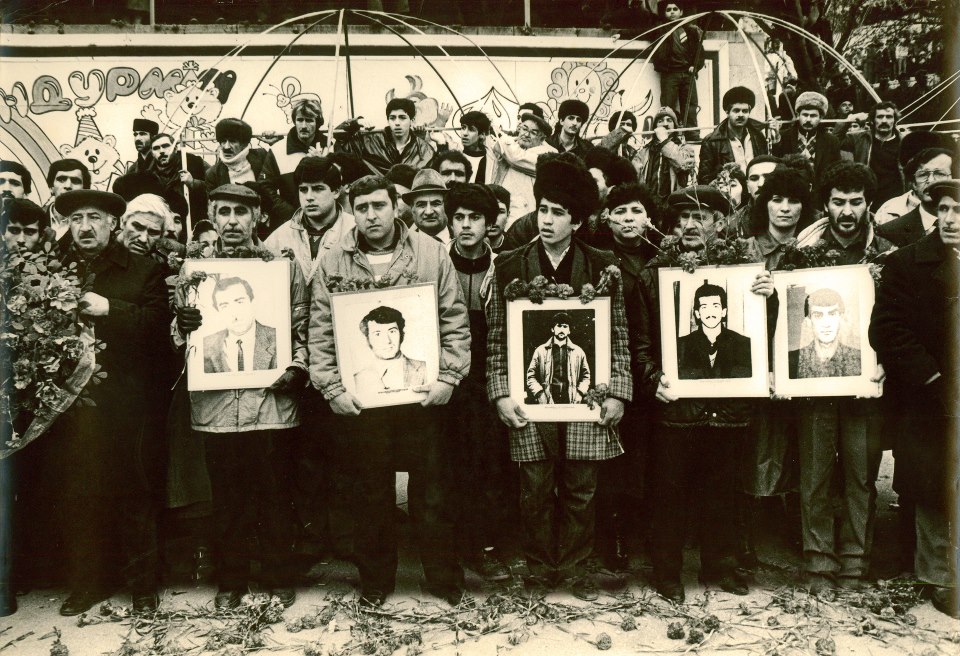History through eyes of witnesses

By Sara Rajabova
The lives of hundreds of people had been cruelly interrupted on that terrible night - the night from January 19 to 20, 1990 that was engraved to the history of Azerbaijan with the blood of people who fought for the independence of their country.
The January events that occurred in the background of the process of Soviet regime’s collapse have shown to the world the other side of the Soviet dictatorship. This was another face of the regime that was not hesitated to brutally kill the people, whom it once referred as its citizens.
The tragedy cannot be better told than by a witness. The witnesses of this bloody night remember with pain what happened 25 years ago.
“The events of January 1990 became for me an open wound forever that has not stopped hurting. I remember the events of those days to the smallest details,” said Boris Dobin, a well-known photographer and member of the Israel – Azerbaijan International Association (Aziz).
“It was scary to walk in the streets. There were corpses everywhere. It was obvious that the army had fired on every people, who were unarmed and showed no resistance. What the army committed during the night from 19 January to 20 in Baku was a real fascism - otherwise I cannot define. It is impossible to forget the pain and confusion of people of Baku in those days,” said Dobin.
Looking to the background of the massacre by the Soviet troops, it is clearly understood that this military operation was totally planned and calculated. This aggression against Azerbaijani people was fulfilled step by step.
On that tragic night of January 19, Azerbaijan was isolated from the world. The USSR State Security Committee's "Alfa" group exploded the energy block of the Azerbaijani television to stop it from broadcasting, and the press was silenced. People were not aware of the emergency situation announced in Baku and all those on the streets were killed brutally.
Also, foreigners were not allowed to enter the city. Western reporters were banned from traveling to Baku to cover the events.
Reza Deghati, a world-known French photojournalist, was one of the people who with a great difficulty entered Baku during those turbulent days.
“I'll never forget how sad everybody was. I've visited more than 85 countries in my lifetime, but I would have to admit that during those days, Baku was the saddest city I had ever seen in all my life. The people were in a daze, totally shocked and disoriented. It was incomprehensible to them that the Russians had orchestrated an attack on them and killed innocent people. After all, they had taught for 70 years about the great brotherhood of the Soviet Union,” Reza told Azerbaijan International journal several years ago.
He talked about the horror he had seen in the hospitals in Baku which was then filled with the wounded.
“I'll never forget the horror that filled those halls. The rooms were so crowded, the wounded and dying were lying, unattended, in the corridors,” he remembered.
As the Soviet leadership tries to conceal all the atrocities they’ve committed in Baku, the international media has been unable to reveal the true essence of the January events. However, Reza with his two colleagues who visited Baku with him were only ones who informed the world about that terrible tragedy.
“Looking back to those days in Baku, I'd have to admit that despite all years of working in difficult places, I was terribly afraid of something happening to us in Azerbaijan - that, somehow, we would disappear. After all, we were witnessing events and gathering information that the whole Empire was denying, what the whole world was waiting to hear. We were the only ones who were carrying the story out,” Reza said.
Despite the fact that more than two-decades have passed from the Black January tragedy, the offenders of this bloody crime are still not punished. The aggression against Azerbaijani people was not assessed as a crime against humanity in the international arena.
The main author of this bloody crime against Azerbaijani people was Mikhail Gorbachev, who was then leader of the Soviet Union. He was not only punished but also received the Nobel Peace Prize for his "leading role" in the peace process the same year.
Gorbachev, the first and last president of USSR, wrote in his memoirs, Life and Reforms, that "the life of many Baku residents stopped in January 1990. It's hard, it's very hard.”
"I took lessons from this tragic incident: the solution to the problem should be found only in a political way," Gorbachev confessed in his book.
Unfortunately, nothing will atone for the lives of hundreds of victims of the January massacre or calm the relatives of those people. There is an act of crime and terror against the civilians and innocent people of Azerbaijan and the culprits of this heinous act should be punished.
The tragedy of January 20, which influenced the national liberation movement and the democratic process in the country, failed to break the will of the people in their struggle for independence. This was a kind of heroism for the freedom and territorial integrity of Azerbaijan.
Azerbaijan gained its independence that it had been dreaming of for many years, and achieved sovereignty. Azerbaijan declared its independence on October 18, 1991.
Under a decree of President of Azerbaijan Heydar Aliyev dated December 16, 1999, all the victims of the crackdown were awarded the title "Martyrs of January 20."
Here we are to serve you with news right now. It does not cost much, but worth your attention.
Choose to support open, independent, quality journalism and subscribe on a monthly basis.
By subscribing to our online newspaper, you can have full digital access to all news, analysis, and much more.
You can also follow AzerNEWS on Twitter @AzerNewsAz or Facebook @AzerNewsNewspaper
Thank you!
